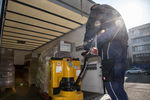Identification of transcription factors affecting the self-renewal or lineage specification of human hematopoietic progenitor cells
Symone Vitoriano
Hematopoietic stem cells (HSCs) contain a life-long potential to self-renew and to create daughter cells being committed to differentiate. In this context, the decision between self-renewal and differentiation needs to be tightly controlled. A main goal in stem cell biology is to unravel mechanisms regulating the bias of this decision process. Here, we aim to identify cell fate determinants being involved in this process. Previously, genome wide GeneChip analyses of cell fractions enriched for more primitive and more mature hematopoietic progenitor cells were performed. A number of specifically expressed transcription factors (TFs) have been identified which have not previously been associated with early hematopoiesis. Different TFs have been cloned into IRES-eGFP cassette containing lentiviral vectors, allowing their transduction into different cell types. To test for their functional impact, human umbilical cord blood derived CD34+ cells are transduced with the obtained constructs. To monitor effects of the transgenes, the expression of different cell surface antigens including CD133, CD34 and CD45RA is recorded over time, allowing discrimination of different progenitor subsets. Furthermore a variety of different functional assays are performed Following the lentiviral driven expression of the different TFs, three effector categories have been defined: ectopically expressed TFs which i) do not affect the relation of the different hematopoietic subpopulations to each other, and TF which i) accelerate or iii) reduce maintenance of the progenitor pool over time.






